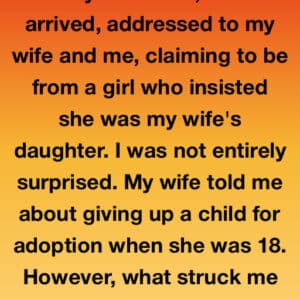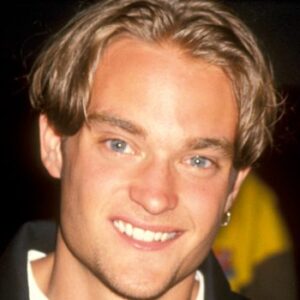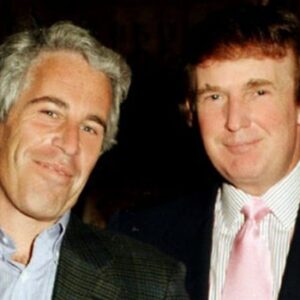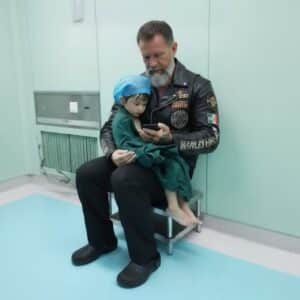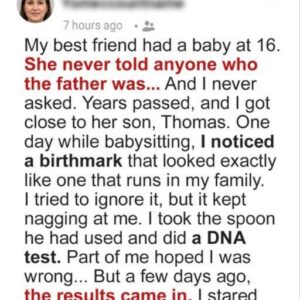I was 63 years old when I boarded a flight to Montana to bury my son.
Robert sat beside me, his hand resting on his knee, fingers twitching like he was trying to smooth out wrinkles that weren’t there. He’d always been the fixer, the man with duct tape in the glove compartment and backup plans in his back pocket. But that morning, on that cramped little row at the back of the plane, he felt like a stranger I used to know.
We’d both lost the same person, but our grief moved like two rivers running side by side, close enough to hear but never quite touching.
“Do you want some water?” he asked quietly, like the question itself might break me.
I shook my head. My throat was too tight for kindness.
Advertisement
The plane lurched forward, engines rumbling, and the safety demo played somewhere in front of us. I pressed my fingers hard into my palms, trying to anchor myself to something other than the ache in my chest. For days, I’d been waking up with my son’s name caught in my throat, but this moment—seatbelts clicking, cabin air hissing, the ground pulling away—felt like the exact second grief stopped pretending and showed itself fully.
Then the intercom crackled to life.
“Good morning, folks. This is your captain speaking. We’ll be flying at thirty thousand feet today. Skies are looking smooth all the way to our destination. Thanks for choosing to fly with us.”
Everything inside me went still.
The voice was deeper now, matured and confident, but the cadence, the warmth under the professional tone—I knew it. I hadn’t heard it in over forty years, but my heart recognized it before my mind caught up.
My chest seized, a hard, sudden clench.
That voice was like a door creaking open in a hallway I thought I’d locked and boarded up. And there I was, on my way to my son’s funeral, realizing fate had just stepped back into my life wearing golden wings on his chest.
In an instant, I wasn’t 63 anymore.
I was 23 again, standing in front of a cracked chalkboard in a crumbling Detroit classroom, trying to sell Shakespeare to teenagers who’d seen more violence than verse. Most of them watched me with wary eyes, like I was just another adult passing through—a temporary fixture they couldn’t afford to trust.
They’d already learned what it meant when grown-ups made promises. They knew school was often just a holding place between fights and the chaos at home.
But one boy stayed with me.
His name was Eli. Fourteen, undersized, quiet in a way that made you lean in if he spoke. Polite to a fault. He didn’t talk unless invited, but when he did, his voice carried this strange mix of hope and exhaustion.
He had a knack for anything that hummed, clicked, or turned with gears. Radios, fans, that ancient overhead projector every teacher feared touching—Eli could coax them all back to life.
One icy afternoon, my old Chevy died in the parking lot, refusing to even cough. Eli lingered by my desk until the room emptied out.
“Ms. Margaret, your car won’t start,” he said, like it was a simple weather report. “It’s probably your starter. I can look at it, if you want.”
Five minutes later, he was under the hood with a screwdriver and the confidence of a seasoned mechanic. I watched him work, thinking, This boy deserves more than this street, this building, this corner of the world that keeps trying to swallow him whole.
His father was in prison. His mother was more rumor than presence. Sometimes she’d appear at the school office, loud and unsteady, smelling of cheap gin, asking for bus tokens or food vouchers. I did what I could: extra snacks in my desk, pencils when his were gone, a ride home if the buses stopped running.
Then the phone rang one night.
“Ms. Margaret?” The voice on the other end was tired and official. “This is the precinct. We’ve got a student of yours—an Eli. Picked him up in a stolen vehicle with two other boys.”
My heart dropped straight through my ribs.
By the time I reached the station, he was sitting on a metal bench, hands cuffed, shoes muddy. He looked up when I came in, his eyes wide, the tough mask gone.
“I didn’t steal it,” he whispered as I crouched beside him. “They said it was just a ride. I didn’t know it was stolen. I swear.”
And I believed him. Completely.
Two older boys had hot-wired a car, taken it for a spin, and dumped it near the alley behind the corner store. Someone had seen Eli with them earlier and, in neighborhoods like ours, proximity was as good as guilt. He hadn’t been in the car when they found it, but he was close enough to be easy to blame.
“Looks like the quiet one was the lookout,” an officer said, glancing at him like he’d already made up his mind.
Eli had no record, no advocate at home, and no voice loud enough to cut through the assumptions in that room.
So I lied.
I told them he’d been with me after school, helping with a project. I gave them a time, a task, a neat explanation. None of it was true, but I said it with the certainty of someone who refused to watch another kid be fed into the system because it was convenient.
It worked. The officers grumbled, shrugged, and decided it wasn’t worth the paperwork. They let him go with a warning.
The next day, Eli appeared at my classroom door with a single wilted daisy clutched in his hand.
“I’ll make you proud someday, Ms. Margaret,” he said. His voice was still quiet, but now it carried something else—resolve.
Then he was gone. Transferred. Moved. Vanished into the shuffle of files and students I’d never see again.
I never heard from him after that.
Not until that flight.
“Honey?” Robert nudged my arm gently. “You’re pale. Do you need something?”
I shook my head, still listening to the echo of the captain’s voice ricocheting through memories I hadn’t touched in decades. I didn’t say another word for the rest of the flight. I sat with my hands clasped too tightly in my lap, my heart beating faster than it had any right to.
When we landed, people surged to their feet, overhead bins clacked open, and everyone fought for an extra inch of aisle. I turned to Robert.
“You go ahead. I need to stop by the restroom,” I said.
He nodded, weary and hollowed out, and shuffled forward with the line. We’d stopped asking each other “why” a long time ago.
I lingered near the front, pretending to scroll my phone as the cabin emptied. My stomach fluttered with every step closer to the cockpit. What if I was wrong? What if it was just a stranger with a similar tone and this whole fragile hope was nothing but grief playing tricks?
The cockpit door opened.
The pilot stepped out—tall, well-kept uniform, gray threading through his dark hair, laugh lines etched at the corners of his eyes. Those eyes landed on me and widened. For a beat, time folded in on itself.
“Ms. Margaret?” he asked, his voice soft, disbelieving.
“Eli?” I whispered.
He grinned then, rubbing the back of his neck. “I guess it’s Captain Eli now.”
We both laughed, a little shaky, like neither of us quite trusted that this was real.
“I didn’t think you’d remember me,” he said.
“Oh, honey,” I replied. “I never forgot you. I heard your voice at the start of the flight and it… took me right back.”
His gaze dropped briefly, then returned steady and warm. “You saved me back then. I never got to really say thank you.”
“But you kept your promise,” I said, swallowing around the lump forming in my throat. “You said you’d make me proud.”
“It meant something to me,” he said. “That promise became my own motto when things got hard.”
We stood there, two lives that had once crossed at a fragile angle, now meeting again in an airport corridor full of strangers rushing past. For the first time in weeks, I felt seen.
“So,” he asked gently, “what brings you to Montana?”
The answer sat heavy on my tongue. “My son,” I said quietly. “Danny. A drunk driver hit him last week. We’re here to bury him.”
His expression shifted, all the light folding inward. “I’m so sorry,” he said. “That’s… that’s not fair at all.”
“He was 38,” I continued. “Smart. Funny. Stubborn as his father. I thought he’d outlive us both.”
Silence stretched between us, not awkward, just full.
“There was a time,” I admitted, “when I thought if I helped save one life, maybe it would protect the ones I loved. That if I did enough good, it would come back to my own house somehow.”
Eli’s eyes softened. “You did save a life, Ms. Margaret. You saved mine. And it did come back—just… not in the way any of us can bargain for.”
We talked for a few more minutes, careful and gentle, like people rediscovering a language they hadn’t spoken in years. Before he left, he hesitated.
“Stay in Montana a little longer,” he said. “If you can. There’s something I’d like to show you.”
My first instinct was to say I needed to get home, but the truth was, home was a place full of echoes and unsaid things. Robert and I had become two silhouettes passing in the same rooms.
“I’ll try,” I said.
The funeral was as beautiful as something that awful can be. People moved past us in a slow procession, hands brushing my arm, their voices blending into one long murmur of “I’m so sorry” and “He’s in a better place.” I stared at the cuff of the suit they’d dressed him in. Danny would’ve hated that color. I fixated on that small, wrong detail because everything else felt too big to touch.
At the graveside, dirt thudded against the wood of the casket, and every sound felt like a door closing. Robert’s knuckles were white on the shovel handle. He didn’t look at me, and I didn’t ask him to.
I couldn’t bring myself to stay in Danny’s house after that. His coffee mug on the counter, his shoes by the door—it was like being haunted by a life that had barely cooled.
A week later, Eli kept his promise. He picked me up in a modest truck, his presence strangely calming. We drove past fields and low hills, the sky wide and indifferent above us, until we pulled up to a small white hangar tucked between stretches of green.
Inside, under humming fluorescent lights, stood a bright yellow plane with “Hope Air” painted across the side in bold letters.
“It’s a nonprofit I started,” Eli said, a hint of pride in his voice. “We fly kids from rural areas to hospitals for treatment. Most of their families can’t afford travel or time off work. We make sure they don’t miss their appointments.”
I stepped closer, my hand trailing over the cool metal of the fuselage. The plane looked… joyful. Like someone had bottled sunlight and turned it into wings.
“I wanted to build something that mattered,” he said quietly. “Something bigger than me.”
I turned to him, seeing the boy who fixed broken projectors and the man who now moved children across the sky so they could have a fighting chance.
“You once told me I was meant to fix things,” he added, smiling a little. “Turns out flying is how I learned to do it.”
He reached into his bag and pulled out a small, worn envelope.
“I’ve been holding onto this for a long time,” he said. “Didn’t know if I’d ever get the chance to give it to you.”
Inside was a photograph: me at 23, standing in front of my classroom chalkboard, hair pinned back, a streak of chalk dust across my skirt. Someone had caught me mid-laugh. I remembered the day suddenly—the school had brought in a photographer to take staff photos for the hallway.
On the back, in crooked teenage handwriting, were the words:
“For the teacher who believed I could fly.”
The tears came before I could stop them. I pressed the photo to my chest like it might steady my heart.
“I wouldn’t be here if it weren’t for you,” Eli said.
“You don’t owe me anything,” I managed.
“It’s not about owing,” he replied. “It’s about honoring the people who helped you become who you are. You gave me a start. I just… kept going.”
The shadows in the hangar stretched long across the floor as the sun dipped lower. For the first time since Danny died, grief loosened its grip just enough to let something else in—pride, maybe. Or purpose.
Later, as he drove me back toward town, he glanced over.
“Do you have time for one more stop?” he asked. “It’s close.”
I nodded.
His house sat just past a simple wooden gate, modest and inviting. On the porch, a young woman in her twenties greeted us with a smile and flour dusted across her cheeks.
“She’s the best babysitter in the world,” Eli whispered. “They’re making cupcakes. Consider yourself warned.”
Inside, at the kitchen counter, stood a boy with messy brown hair and green eyes that were unmistakably his father’s. He was carefully spooning lopsided dollops of frosting onto a tray.
“Noah,” Eli called. “There’s someone I want you to meet.”
The boy turned, gave me a quick, assessing look, then smiled and stepped forward.
“Hi,” he said shyly.
“This is my teacher, Ms. Margaret,” Eli told him. “The one I told you about.”
Noah’s eyes brightened. “The one who helped you when you were my age?”
I felt my throat tighten again, but this time from something gentler.
Before I could answer, Noah walked right up to me and wrapped his arms around my waist in a firm, earnest hug.
“Dad says you’re the reason we have wings,” he said into my cardigan.
My arms folded around him automatically. He felt solid and warm, like proof that some choices echo long after you make them.
“You like planes, Noah?” I asked when he pulled back.
“Yeah!” he grinned. “I’m going to fly one someday. Just like my dad.”
Eli watched us from the doorway, his expression soft and full. We sat together afterward, eating cupcakes that were far too sweet and talking about airplanes and school and favorite ice cream flavors. For the first time in two weeks, I didn’t feel like a woman whose only identity was “mother who lost her child.” I felt like a teacher again. Like someone who still had something to give.
I never had grandchildren. I’d quietly grieved that long before Danny died. Robert and I were fraying at the edges, and I knew, deep down, that one day he would pack his grief and his silence and move somewhere else.
But now, every Christmas, there’s a crayon drawing taped to my fridge. Sometimes it’s a yellow plane. Sometimes it’s a stick-figure pilot with a tiny woman beside him. Every one is signed the same way:
“To Grandma Margaret. Love, Noah.”
I still miss my son. I always will. Love doesn’t disappear just because the person does. But somewhere between one boy I helped in a broken classroom and the man he became, life circled back and handed me a new kind of family.
And in that unlikely, impossible loop—from Detroit to Montana, from a precinct bench to a bright yellow plane—I realized something:
I couldn’t save everyone I loved.
But I had saved someone.
And sometimes, that’s enough to bring a little light back into the darkest places.
